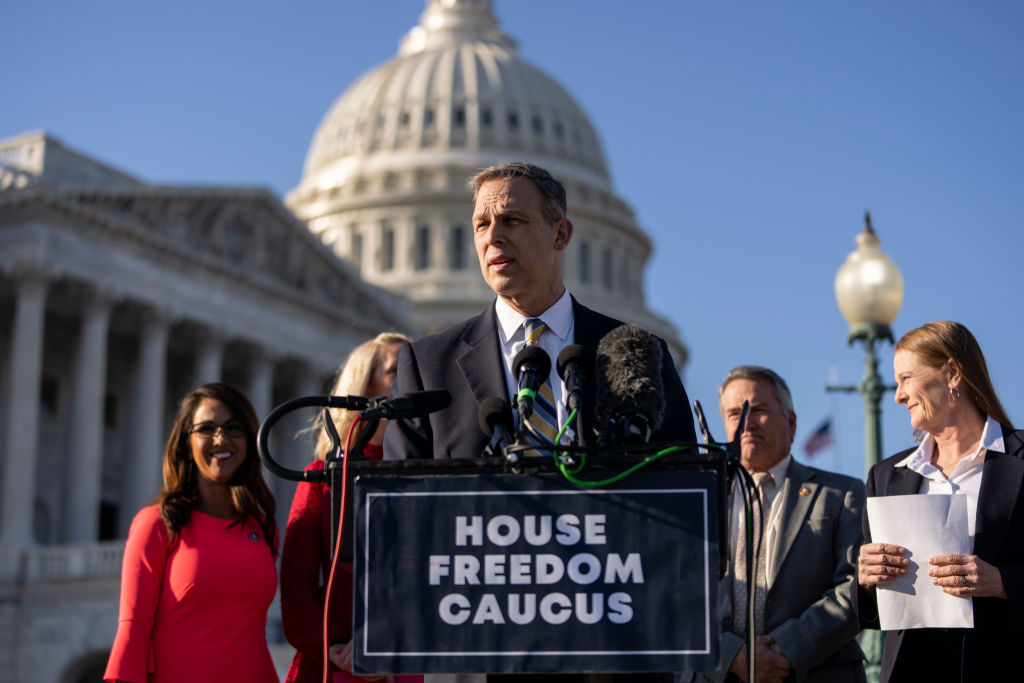GOP “leadership” are the regime’s loyal opposition.
It’s the Cost of Healthcare, Stupid

Cutting the rising price of healthcare is a bipartisan issue.
Ever since the failure to repeal and replace Obamacare, Republicans have largely shied away from the issue of healthcare. That’s a mistake. If Republicans don’t adopt an agenda to lower healthcare costs, they may very well find ourselves on the losing end of the next election.
With a closely divided electorate in which voting blocs are sliced and diced to achieve the slimmest of gains, a whopping 39 percent of voters have said they’d be willing to cross party lines to vote for a candidate whose top priority is reducing healthcare costs. This is particularly true among Democrats, black and Hispanic voters, and women—groups that Republicans need to attract.
Further, polling shows that 50 percent of Americans believe reducing the cost of care and prescription drugs should be the government’s number one healthcare focus. That’s more than three times the interest in breakthrough medical research, and far above opioid overdoses or even medical safety.
But in the last Republican debate, even the most seasoned politicians running for their party’s presidential nomination missed the opportunity to declare unequivocally their goal to lower healthcare costs. Instead they uttered platitudes about “transparency.” Worse still, legislation moving through Congress is based on bad policy ideas promoted by Democrats but, sadly, being adopted by a lot of Republicans.
Understanding the political gains at stake, Democrats are taking the offense on healthcare costs, advancing more government mandates and regulations. Unfortunately, these measures distort the market and lead to higher costs and worse outcomes. Republicans should promote initiatives that prioritize reducing costs through the private market, the only mechanism that leads to lower prices, more innovation, and better health for Americans.
Since last year I have been proposing a litmus test for conservatives considering healthcare policies. Lawmakers must ask: “Would this policy empower the private market to lower overall healthcare costs?” If the answer is “yes,” consider moving forward; if not, pump the brakes.
There are two types of players in American healthcare: those financially rewarded for improving care and lowering costs and those who are incentivized to increase the cost and quantity of care someone receives. The more drugs you take, the more hospital visits you make, the more money pharmaceutical companies and hospitals make.
Overhauling the Food and Drug Administration ought to be a major priority, along with incentivizing innovation, confronting hospital monopolies, and increasing competition in drug pricing.
The FDA requires the developers of biosimilar medications—the counterpart to generic drugs—to wade through reams of red tape before receiving approval, even though the drugs in question are molecularly identical to well-established medicines. This means, for example, that insulin equivalents require redundant studies before they’re able to meet the economic needs of diabetic patients. Senator Mike Lee has introduced legislation to address this problem. This is exactly the kind of solution Republicans should embrace instead of the price controls that Democrats demand.
Another way to increase the availability of lower-cost medications and incentivize innovation is to reform the patent system. Drugmakers amass hundreds of patents, or “patent thickets,” to extend their monopolies far beyond the protection intended under the law. These anti-competitive practices delay or block lower-cost drugs, generics, and biosimilars from entering the market, raising the cost to the public.
In the debate, and to her credit, Nikki Haley said we need to “get rid of Certificate of Needs systems.” Certificate of Needs laws require providers who want to open or expand a healthcare facility to prove to the government that the community needs the planned services instead of letting them enter the market and succeed or fail on their merits. This means that giant hospital systems dominate markets, stifle competition, and jack up prices.
Giant hospital systems have been buying up doctors’ practices and smaller healthcare providers, in large part due to Obamacare. Now, they use a dishonest billing technique to charge your health insurance for a doctor’s appointment as if it was a (costlier) hospital visit. That needs to be reined in.
The Federal Trade Commission’s nonprofit exemption prevents enforcement of antitrust law with respect to “not-for-profit” hospitals. For many of those hospitals, their non-profit status is a technicality, and they frequently pay their CEOs millions in salaries. That exemption should be eliminated, and the FTC should monitor hospital mergers and acquisitions to evaluate the impacts that consolidation has on healthcare prices and block those that are anti-competitive.
“Any Willing Provider” laws are on the books in 35 states. These laws mandate that health plans accept all legally licensed providers—regardless of performance or record of patient safety—into their networks, disincentivizing providers from negotiating to join networks, resulting in higher prices. According to independent economic studies, AWP laws increase hospital spending 4.7 percent, physician spending 6 percent, and drug spending 5.8 percent.
On drug costs, Medicare is set to begin negotiating with pharmaceutical companies for lower prices on ten medications. But there’s already a player in the private market negotiating lower prices for every medication. Pharmacy Benefit Managers (PBMs) negotiate the drug portion of health insurance plans for businesses, government agencies, unions, and other organizations, using their economies of scale to squeeze lower prices from pharmaceutical manufacturers and wholesalers. One study estimates the combined value of the various PBM tools to be $145 billion annually, and another found they save the average American nearly $1,000 per year.
Yet inexplicably, some Republicans in Congress are joining with Democrats to target PBMs, the one link in the pharmaceutical supply chain with the incentive to lower prices for the consumer. Regulating PBMs would take away their important power to lower the cost of drugs for the groups which hire them to do so. The lack of a clear and defined Republican healthcare agenda leaves conservatives susceptible to following Bernie Sanders’ lead in healthcare.
It’s not surprising that Democrats want to distort the market, regulate, mandate, control prices, and move us toward big-government healthcare. But Republicans must fight these dangerous and counter-productive initiatives by letting the people determine what works for them and increasing choices and competition.
Obamacare was sold to the public as a way to lower healthcare costs. It didn’t. Instead, every year healthcare spending increases, outstripping inflation by a wide margin. That’s because the mandates and regulations in the law drive up costs.
And these rising healthcare costs are ringing the bell for voters. Republicans must take the initiative and promote an agenda that explicitly targets healthcare costs.
The American Mind presents a range of perspectives. Views are writers’ own and do not necessarily represent those of The Claremont Institute.
The American Mind is a publication of the Claremont Institute, a non-profit 501(c)(3) organization, dedicated to restoring the principles of the American Founding to their rightful, preeminent authority in our national life. Interested in supporting our work? Gifts to the Claremont Institute are tax-deductible.
Rising wokeness in medical schools is a problem for patients everywhere.
Some friendly liberal advice to Republicans.
If Democrats believed in their positions, they wouldn’t have to deceive.
The official Republican vision of political power is so constrained that you have to wonder why they want it.
The trans lobby lies about the harmful effects of steroids on human development.






